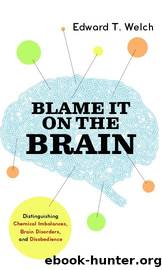Blame it on the Brain by Welch Edward T

Author:Welch, Edward T. [Welch, Edward T.]
Language: eng
Format: epub
ISBN: 9781936768141
Publisher: New Growth Press
Published: 2012-01-30T00:00:00+00:00
PROPOSITION 3 Psychiatric labels are descriptions, not explanations.
Have you noticed that if you say, âI have attention deficit disorder [ADD],â it seems very different from saying, âIt is hard for me to pay attention to verbal presentations for very longâ? Somehow, the psychiatric diagnosis seems to have greater authority than the laypersonâs description. ADD is something you have; the other statement is a simple description of something you do. Yet the difference between the two statements is less than you think. With ADD, except for the fact that the psychiatric definition is longer, there is really no difference between the two: both describe symptoms and neither explains the cause of those symptoms.
As a description, ADD summarizes what a child does but not why he does it. The difference between the two is significant. For example, if I asked you about a car you just saw speeding by, a descriptive or âwhatâ answer would be, âThat was a green car and it was going too fast.â An explanatory or âwhyâ answer, however, would review the basics of combustion engines, the mechanics of automatic transmissions, and the motivation of the driver.
Psychiatric descriptions begin to answer what the child is doing, not why. Sometimes the descriptions can be helpful and highlight symptoms we havenât previously considered. In other words, instead of describing a green car, you might say,â That was a green Ford Taurus station wagon with a 2.0 liter engine, and it was going 73 miles per hour in a 45 mile per hour zone.â This is more descriptive than saying, âA green car going too fastâ (and it sounds more intelligent), but it is still just a description.
The ADD description is a careful one. If you want to understand what specific behaviors contribute to your childâs poor school performance, then the symptom list associated with the term ADD might reveal behaviors that you had not previously considered. Yet this descriptive category is still limited in its usefulness.
Letâs say someone asks, âWhy is your son always squirming in his chair?â You respond, âBecause he has ADD.â This would be like saying, âHe squirms in his chair because he fidgets a lot.â For most people, this would not be a satisfactory answer. You are answering the why question with a what answer.
The psychiatric literature typically does not make that distinction clear. Most discussions about ADD and similar psychiatric problems assume that the lists of descriptions are equivalent to establishing a medical diagnosis â a medical cause. The popular assumption is that there are underlying biological causes for these behaviors, but this assumption is unfounded. Although there are dozens of biological theories to explain ADD, there are currently no physical markers for them, no medical tests that detect their presence. Food additives, birth and delivery problems, inner ear problems, and brain differences are only a few of the theories about the causes of ADD. They are all intriguing but so far unsupported by medical research. Each theory may have some merit in specific cases, but there is no one biological theory that can consistently explain the symptoms.
Download
This site does not store any files on its server. We only index and link to content provided by other sites. Please contact the content providers to delete copyright contents if any and email us, we'll remove relevant links or contents immediately.
Machine Learning at Scale with H2O by Gregory Keys | David Whiting(4313)
Never by Ken Follett(3957)
Fairy Tale by Stephen King(3399)
Reminders of Him: A Novel by Colleen Hoover(3121)
The Man Who Died Twice by Richard Osman(3080)
Will by Will Smith(2920)
It Starts With Us (It Ends with Us #2) by Colleen Hoover(2367)
Rationality by Steven Pinker(2366)
Can't Hurt Me: Master Your Mind and Defy the Odds - Clean Edition by David Goggins(2341)
Friends, Lovers, and the Big Terrible Thing by Matthew Perry(2230)
The Becoming by Nora Roberts(2203)
The Stranger in the Lifeboat by Mitch Albom(2123)
Love on the Brain by Ali Hazelwood(2078)
New Morning Mercies: A Daily Gospel Devotional by Paul David Tripp(1919)
A Short History of War by Jeremy Black(1848)
HBR's 10 Must Reads 2022 by Harvard Business Review(1845)
The Strength In Our Scars by Bianca Sparacino(1843)
A Game of Thrones (The Illustrated Edition) by George R. R. Martin(1745)
Never Finished: Unshackle Your Mind and Win the War Within by David Goggins(1713)
